I Ching, Yijing or Zhou Yi
"Oracle of the moon": © 2000 LiSe
 Yi Jing, Oracle of the Moon
Yi Jing, Oracle of the Moon


Characters of Yijing
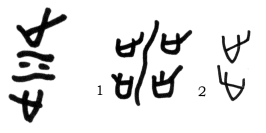
Shè: wade across. Foot-prints (steps, a left and a right foot) on both sides of a river: wade across, ford; go through; involve.

Da: great
Several different explanations:
Wenlin: A person with arms stretched out to mean ‘big’, great; high; tall; vast; much; very; old; eldest, adult.
Wieger: "A 木 tree crowned with its 丵 foliage. The moral foliage, the deeds of a man, the affairs upon which he exerts his activity, and what he acquires by his doings, viz. merits, goods, titles, etc."
Ricci 12584: Notched (serrated) decoration at the top of the suspension of a bell or drum.
Wang Hong Yuan: a pillar.
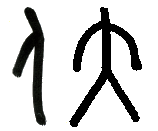 Daren: the great man. There is a very interesting meaning of this great man, see Harmen's article: "In the Yi the daren might refer to the chief diviner who would perform the bone oracle ritual after the offering has been accepted by the ancestors."
Daren: the great man. There is a very interesting meaning of this great man, see Harmen's article: "In the Yi the daren might refer to the chief diviner who would perform the bone oracle ritual after the offering has been accepted by the ancestors."
In Yi: 1.2 and 5; 6 image; 12.2 and 5; 30 image; 39 Guà cí and 6; 45 + 46 + 47 all in the Guà cí; 49.5; 57 Guà cí and 5.
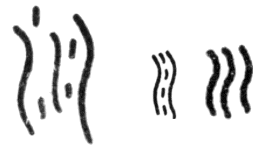
Chuān: stream, river
River. Old character: 巛 or 川.
Running water between two borders.
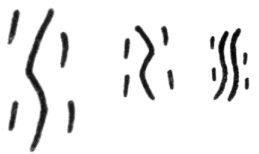
Shui: water
A picture of running water, a stream.

Dao: way
A (cross-)road with in the center a head and a foot. Road + foot is 'go'. To go one's road.
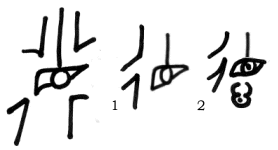
De, virtue
A crossroad, in the center of it an eye with a line indicating the straight direction on the road.
Way, road, principle, natural law, follow the road (of duty), to say, to tell, conscience, social order, adeptness, class, category, sacrifice to road-divinities, behavior, perform one's duties, method, honest, riverbed, dredge a riverbed, to cure, conduct, lead.

Biàn, trail (Hex.13, the great image)
Karlgren: “Picture of an animal’s track”.
Wieger: “The steps of a wild beast 象. The strokes represent the print of the claws, and the points the print of the soft parts. The examination of the trail indicating the kind of animal, hence the extended meaning, to discriminate, to part, to sort out. The excreta giving the same indication, 釆 means dung in 粪".
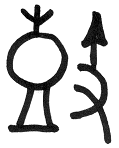
Gu, drumming
Picture of a drum with a hand holding a drumstick. In China, red drums have always been a symbol of the power of the ruler and the destiny of the army. Drums are brought out whenever there were ceremonies or festivities. Weddings and funerals and all ceremonial occasions demand the insistent beat of drums. "The oxhide drum and iron bell are sounded to call the gods’ attention to the petitions of worshippers." Human blood was rubbed into drums for magical purposes.
(Hex.30.3 and 61.3)
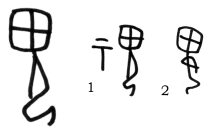
Gui, ghost, devil
The Gui tribe lived across the Chinese borders and often raided the lands close to the borders. (Hex.38.6, 63.3 and 64.4)
The character xiu (hand + sheep): delicacies, to devote, offer (as tribute), to eat, a meal, nourish, viands, to present. I found the 'offering in expiation for a wrong' in Wu. It explains the change in meaning from offer to shame. In our time and culture I think "apology" comes close. In 12.3 and in 32.3


